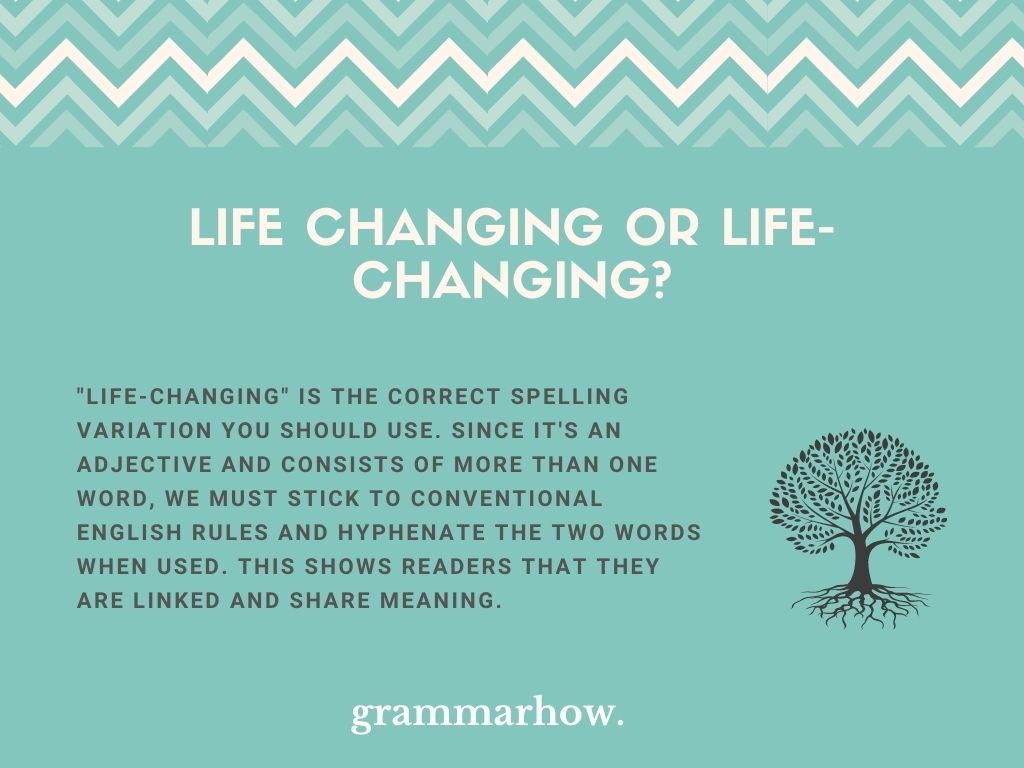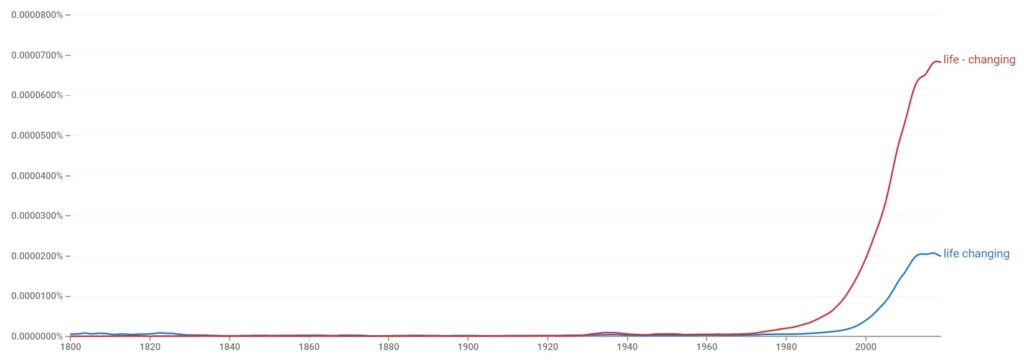The word “life-changing” is most commonly used as an adjective. It would help to learn more about it and whether we should write it in one or two words or a hyphenated form. This article will help you to understand the correct form.
Life changing vs. Life-changing
“Life-changing” is the correct spelling variation you should use. Since it’s an adjective and consists of more than one word, we must stick to conventional English rules and hyphenate the two words when used. This shows readers that they are linked and share meaning.

According to Google Ngram Viewer, “life-changing” is the grammatically correct choice. It’s much more popular than the two-word variation, so you should stick to using it in this hyphenated form whenever you write it.

In The Cambridge Dictionary and The Oxford Dictionary, only “life-changing” is listed as the correct spelling. Both dictionaries recognize that it is an adjective, which is why the hyphenated form is so important to use in all cases.
Neither dictionary notes that “life changing” should be used. Some people might argue that it would work as a noun, but it’s not typically a phrasal noun, so you won’t come across it all that much in English.
Life changing
“Life changing” is not correct. We do not write it as two words because it does not help to show a link between the two words. Remember, the hyphen is a key part of grammatical rules in English, and we must remember to use it for multiple-word adjectives wherever possible.
Since “life changing” is only ever used with another noun, it is used as a modifier. Therefore, we must always link the words. We can refer to AP Stylebook guidelines when we need to know more about hyphenation rules (which we’ll get to in the next section).
For the time being, why don’t you check out the following examples to help you figure it out:
- Correct: These events are truly life-changing. I don’t know what to do about them.
- Incorrect: That’s a life changing amount of money! I’ll have to figure out what I want to do with it.
- Correct: I am going through life-changing issues at the minute, but I’m making sure to keep a brave face.
- Incorrect: This is life changing, and I don’t know how to handle it! I wish someone were here to guide me.
Life-changing
“Life-changing” is the grammatically correct choice. We write it as an adjective, and it is more than one word, so we must always link the words with a hyphen. A hyphen is a tool that shows readers that the link is important and the meaning is shared between the words.
According to the AP Stylebook guidelines, all adjectives that are made of more than one word should be linked with a hyphen. We must always include the hyphen whether the noun comes before or after the modifying word, which is why it’s necessary with “life-changing.”
Since AP Style rules are the ones adopted in schools and other educational places, we must follow them whenever we get the chance. They are foundational to the English language.
Here are a few examples to show you how it works:
- Okay, I didn’t expect you to show me such life-changing things on my first day here.
- These events are not nearly as life-changing as you seem to think they are, Matthew.
- It’s life-changing to have to see something like that, but you’ve been so brave to come out on the other side.
- What would you do with this life-changing amount of money? I certainly know what I would do with it!
As you can see, we’ve included examples where the noun comes both before and after the adjective. This was done to drill in the fact that “life-changing” should be written in the hyphenated form whenever you use it.
Is “Changing” Capitalized In The Word “Life-Changing”?
You do not need to capitalize “changing” in the hyphenated form. It is not a proper noun and does not benefit from any part being capitalized.
However, you might find it somewhat useful to remember to capitalize it in a title. If your title style means that you capitalize every other word, then there’s no reason why you can’t capitalize both parts of the hyphenated form.
